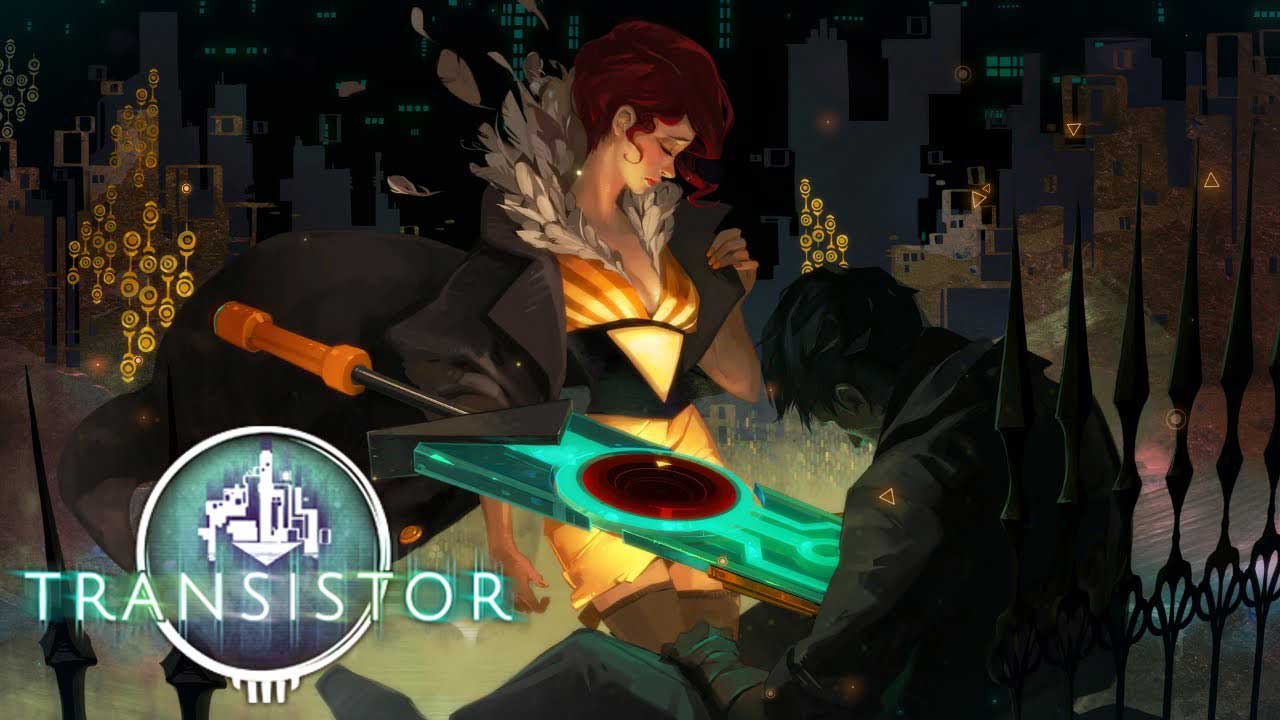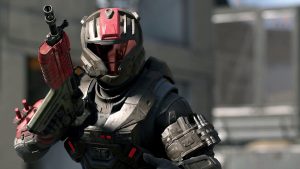Perhaps one of the most memorable and talked about aspects of Supergiant Games titles Bastion and Transistor, is the quality of the games soundtracks and audio design. From the ever present narrator of Bastion, to the interplay of narrative themes with vocal performances in Transistor, what was heard throughout the games, for many, made the experiences vastly more impactful.
Sound Designer Darren Korb and Vocalist Ashley Barrett are given the lion’s share of credit for the soundtrack’s success. During previous interviews with Supergiant Games’ Creative Director Greg Kasavin and Voice-Over Artist Logan Cunningham have provided insight into the studios unique creative processes that emphasize collaboration and taking time to ensure quality.
Korb and Barrett both seemed to latch onto this ideal throughout their collaboration on Bastion and Transistor. We decided to sit down with these artists to hear about how they started working together, what sparked their interest in music, and get some insight into the hidden meanings behind some of the songs that have captivated many.
Jesse Tannous: Can you tell me a little bit about how each of you got into music?
Darren Korb: I started signing when I was really young. Starting around maybe 5 years old I started doing musical theater and did a bunch of that pretty much through high school. I took some piano lessons when I was really young and didn’t like it. I started learning guitar when I was 11 or 12 and started really getting into music. I would play guitar, and started playing in bands, writing songs, and stuff like that. I did that for a long time. I started getting into recording in high school, and that’s when I decided that this is something that was really fun for me and I wanted to keep doing this.
Ashley Barrett: My experience has kinda the same beginning as Darren, which makes sense because we kind of grew up in the same area and pursued the same sort of path. I started doing musical theater when I was around 6 and had my first show. I fell in love with signing and performing and kind of continued that through high school. Then in college I was in some a capella groups which really helped my harmonies and my love for that kind of music making. Then when I moved to New York I was in a few bands and did a few little side projects and hooked up with Darren and started doing this.
JT: Darren, how did you get Ashley involved with Supergiant initially?
DK: We had worked together on a project before Bastion. I worked on a musical with my brother, and was making a demo album. I had personally never met Ashley at that point, but Dan, my brother, had met Ashley, and we had a bunch of mutual friends because we both did musical theater at the same place. I don’t think we were in any of the same shows though. We had kind of missed each other growing up. I had heard through our mutual friends that Ashley was very good at singing so I contacted her and I worked with her on that project. Then when we were making Bastion I thought, ‘Oh I know somebody who has the kind of voice who would be great for this’, so I contacted Ashley and we started working together.
JT: Ashley, Did you ever imagine you’d be doing vocal work for video games and that your songs would be so loved?
AB: No! I mean I first started back when I was really young I actually did a series of voice-over stuff for English as a second language tapes. So I had a little experience from the voice-over world, but never really thought video games was something I would go to, but I think it’s such an interesting industry and its growing super-fast and it is really exciting to be a part of it.
JT: Would you say Bastion and Transistor are what you are most known for?
AB: Yeah definitely. I mean I’ve done some other smaller recordings and I’ve written some of my own music, but I’ve never really had the guts to put it out and really give it a go. So this has kind of been my first foray into it, which is really exciting because I’ve always wanted to do is something with my voice, and make that kind of my sole purpose (laughs). Hopefully it won’t be the only thing I’ll be known for (laughs), but it is definitely the beginning for sure.
JT: Has your work with Supergiant thrust you outside of your comfort zone creatively?
DK: To some degree, for sure. When I started working on Bastion I hadn’t really done any sound design or much direction of actors or anything. In addition to the music I also did all that stuff. There was a big learning curve for me on Bastion in terms of figuring out how I wanted to approach sound design, and how to approach the voice-over stuff from a technical standpoint and also from a creative directorial standpoint. On Transistor there were other challenges, we tried to do some more technically complex things with the music implementation and things like that. It’s always nice to be just beyond what you already known, to do things beyond the scope of what you currently understand because that is certainly a way to improve and learn things as you go. That’s really fun for me. A fun part of the process has always been to learn new things and get better at what I do.
AB: Yeah for me I think it was really interesting having Darren give me notes throughout and give me some direction. For me since I was kind of doing my own thing in New York for so long I didn’t have people guiding me. I think at first it was kind of like, ‘Oh gosh I can hope do this right!’ I know a lot of times we had several takes and I was trying to get it perfect and make sure that Darren liked what was going on. I think that really pushed me to become a better vocalist and I love the way that it ended up sounding even if there were areas when I can tell I would’ve been louder or I wouldn’t have belted that, or whatever it may be.
JT: How major of a factor do you believe that played in the success and overall quality of the soundtracks?
DK: I mean that’s hard to say. I’m just amazed still by how well people have responded to the soundtrack and the fact that people have been so enthusiastic about them. I’ve worked on stuff before that I thought was great and I pushed myself on it, and nobody seemed to be that interested at the time (laughs). So, I didn’t even expect the response that happened, and I didn’t expect it a second time. So, I really don’t know what has gone into that or what has caused people to respond so well. I think what it comes back to for me, is that I really am trying to just do things that are compelling to me, that I find interesting and that I have fun doing. I feel like that is something that people can perceive. If you are doing something honestly and passionately that is going to come across, for whatever that’s worth. So, for me, part of that is pushing myself, and doing stuff outside of my comfort zone a little bit makes it a little more exciting and more fun. So at least indirectly, maybe it has an effect.
AB: I think there was an element of confidence that we had going into Transistor having the support of everyone from Bastion, at least on my end. I was like, ‘Oh my gosh people think that this is good and like the sound of my voice!’ It helped me feel excited to do some more stuff to see what peoples reaction would be.
JT: Darren, all of the songs, especially the ones with vocals, were designed to fit into the overall narrative of the game and seemed to provide clues as to Red’s personality. What was the collaboration like with the other members of the development team to ensure that everything meshed together so well? Did the songs come first or was your direction provided before writing them?
DK: It sort of was similar to how I worked on the songs for Bastion. Greg Kasavin, our creative director and writer, does a lot of work on making a pretty thorough game world document that really had a lot of rich backstory about the characters and the world that is not included in the game necessarily. We all had access to that while creating for the game. I think that is something I utilized while writing the lyrics. I tried to write the songs from Red’s point of view as best I could and tried to make music that would have meaning where we planned to put them in the game, in terms of what is happening at that moment dramatically, while also giving some context to Red’s personality and her character.
JT: Your lyrical work in Transistor had some obvious narrative tie-ins to the game. For Bastion though, songs like “Build That Wall,” “Mother, I’m Here,” and “Setting Sail, Coming Home,” seem to have a little bit more of a loose connection to the games narratives. Could you talk a little bit about the motivations behind those songs?
DK: For Bastion, I approached the songs as if they were traditional folk songs in the game world, as opposed to Transistor, where I saw them as songs Red had written herself. It made sense to me that the songs in Transistor would be more closely related to the story, lyrically speaking, since they are from Red’s point of view. For “,” I thought of it as a sort of wartime song that the Ura might have sung in the conflict with Caelondia, maybe something Zia would have heard her father sing when she was younger. I imagined as a song that would be sung at funerals.
JT: My interviews with Greg Kasavin and Logan Cunningham paint a pretty unique picture of the development process at Supergiant Games. While Bastion and Transistor are your only games, can you describe some of the differences in you and your studios approach to sound design that might be considered a-typical?
DK: I think for the voice over and the music we certainly have a unique approach as far as I know, in that we work very closely with Logan and he is a big part of our creative process. We spend a long time getting at the character with him, and we would go back and forth a do a lot of experiments. For me writing the music, I’m working on it from the very beginning of the project which I think is a rarity in the industry. Not a lot of composers get to be a part of the creative process defining the tone of the game right from the start.
JT: Ashley, considering the fact that the most we ever hear Red’s voice is during your vocalizations, do you consider yourself the voice of Red herself?
AB: Yeah, it’s pretty cool when you play to hear the humming and obviously the singing as well, and since that is such a big part of her character I would say I identify with Red.
JT: Fans have described Red as perhaps the most well developed female character in video games today, how do you feel about that?
AB: That is awesome. I think it’s very unique. I’ve never seen a game that does what Transistor does with the character development. I think using the lack of speaking and using more of the singing elements does a lot for the imagination. She is definitely pretty rad and kicks a lot of butt.
JT: How did you get inside the characters heads in order to bring them to life through song?
AB: I think for both Bastion and Transistor Darren and I sat down kind of before we started anything and I think I had seen some of that document Darren mentioned. We went through some of the backstory and the character development which helped me get into the mind frame of who they were supposed to be.
JT: You obviously have a career outside of the soundtracks you’ve done for Supergiant, can you tell me a bit about that?
AB: Yes – I am a publicist by day! I work at a PR agency called Access PR and have for the past 7 years. We have offices in San Francisco and New York – so I’ve been jumping back and forth from coast to coast for a while now.
JT: Where could locals see your live performances? Do you have anything available outside of your game work that non-locals could enjoy?
AB: I recently re-located to the West coast so I’m in the process of getting together a new band. I perform with a lot of my musician friends from time to time in California, but nothing is on-going at the moment. Definitely working on that! We just played a really fun show in San Juan Batista at a little music festival called Ranchstock that my friends put on. Next year will be even better! You can check out some fun videos from my old songwriting partner, Dustin Cohen and I on YouTube – there are some real gems in there!
I am also in the process of putting together an album from some of my songs that I wrote a few years back. Darren and I have also talked about working on some non-game related songs, I love working with him so hopefully we can make that happen at some point! Stay tuned for updates – you can check out my website for new details.
JT: If and when Supergiant releases information about their next game project can fans hope to see you both return for another soundtrack? If so, what new styles of music or vocals would you each hope to explore on that project?
DK: My main interest is making something compelling based on the material of the project. What is going to serve that and how am I going to make that as interesting to me as possible? I had a lot of fun doing more vocals in this last game, continuing to push on that I would be fascinated by. I stepped a little bit further out of my comfort zone with Transistor than I did with Bastion and I’d be curious to do that as well in different ways.
AB: I think I agree with Darren for sure, I would be excited just to hear what he could envision for me. A lot of times he has ideas for me and my voice that I wouldn’t necessarily have for myself.
JT: Darren, Many fans have concluded that most of Red’s songs in Transistor seem to characterize her as strong, independent, and unwilling to follow the path laid out to her by her environment. How do the lyrics to “” fit into that analysis?
DK: I don’t want to talk too much about things that are in the world doc stuff, because I don’t want to pull back the curtain too much here. I saw the Spine as a metaphor of her feeling like she understands how the worlds works. ‘I see the spine of the world’, I saw that as someone who could look inside the clock and see all the gears. That was sort of the approach I was using for that metaphor. It characterizes that extra bit of perception that not everybody has, that a lot of artists have, that allow them to write interesting things that are compelling to people because they are tapped into the pulse of everything a little bit more than everybody else.
JT: In this particular song how is Red identifying her connection to the rest of this world in your mind?
DK: I think in the context of that song the angle I was trying to take was, I see how things work as an observer, yet I’m part of it, we’re all part of it.
Supergiant Games is a very interesting studio to see develop as all of the key creative members have remained and helped create their two titles.
So far doing things differently appears to be working out very well for Supergiant Games and their development teams. It seems as though if Korb and Barrett have anything to say about it they’ll be adding their names to the audio credits of a future soundtrack. Until then, fans will simply have to be hopeful, and patient.




